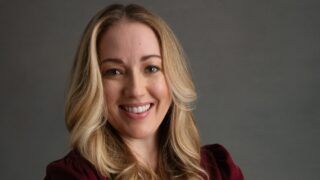The Lavin Agency Speakers Bureau
A speakers bureau that represents the best original thinkers,
writers, and doers for speaking engagements.
A speakers bureau that represents the best original thinkers,
writers, and doers for speaking engagements.
A growth mindset isn’t just for individuals. You can develop it in your whole organization, and unlock radical collaboration and innovation.
We all want our employees and team members to have a growth mindset: the belief that skill can be developed, and the perseverance to pursue improvement. But Dr. Mary C. Murphy says the difference between a fixed mindset and a growth mindset isn’t simply an individual trait, but a cultural one. “Mindset isn’t just in your mind.” And there’s good news: you can build a growth mindset culture across your teams and whole organization, and help everyone thrive. The protégé of growth mindset pioneer Carol Dweck and author of the Amazon bestseller Cultures of Growth, Mary demonstrates how you can change the environment and help your teams become more innovative, more collaborative, more willing to take risks, and more able to benefit from diverse perspectives. “The best and biggest work of our lives comes from collaborating with others to realize our fullest potential collectively,” Mary says. “This can only happen if we shift toward our growth mindset, roll up our sleeves, and work together.”
“Every gathering of people has a mindset culture. Yet the reality is that most organizations have no idea what their mindset culture is, or how it influences the group and their outcomes,” says Dr. Mary C. Murphy, award-winning social psychologist. But when we recognize the importance of having an environment that promotes a growth mindset, we can begin to build that culture and help everyone thrive.
In her groundbreaking original research, Mary investigates the differences between “Cultures of Genius” and “Cultures of Growth.” In Cultures of Genius, which correspond to a fixed mindset, you either have it or you don’t. These cultures value brilliance and smarts over everything else, which makes it difficult for someone to grow, innovate, and take risks. Cultures of Growth, on the other hand, correspond to a growth mindset—those who succeed are highly motivated about learning and developing their abilities, believing that ability can be enhanced through good strategy and organizational supports. And the best part is that any culture can shift towards a Culture of Growth, empowering all individuals to benefit from their growth mindset, and increasing collaboration, innovation, resilience, and more.
In Mary’s revolutionary business book, Cultures of Growth, she illuminates not only how to recognize these two different kinds of environments, but also how to move your organization towards an environment where everyone is empowered to make a valuable contribution. She offers practical exercises and strategies that anyone can use, drawn from her work with Fortune 500 companies, startups, and schools. Financial Times named Cultures of Growth one of the best summer business books of 2024. Forbes calls it “a must-read for business leaders, educators, coaches, and anyone who wants to improve their group endeavors’ performance and satisfaction.” The book includes a foreword by growth mindset pioneer Carol Dweck, and has been lauded by grit pioneer Angela Duckworth.
Mary is the Herman B. Wells Endowed Professor of Psychological and Brain Sciences at Indiana University, founding Director of the Summer Institute on Diversity at the Center for Advanced Study in the Behavioral Sciences at Stanford University, and founder and CEO of the Equity Accelerator: a research and consulting organization that works with schools and companies to create more equitable learning and working environments through social and behavioral science. She conducts pioneering research on motivation, performance, and intergroup relations. Among many other awards, she was named a Rising Star by the Association for Psychological Science (APS) and received the 2019 Presidential Early Career Award for Scientists and Engineers (the highest award bestowed on early career scholars by the US government). Her work is funded by many federal and foundation grants, including an NSF CAREER award for her research on strategies to improve diversity in STEM. Her research has been profiled in The New York Times, Forbes, Harvard Business Review, Scientific American, and NPR, among other outlets.
Performance psychologist Former Director of Mental Conditioning for the New York Giants Author of Life as Sport
Author of Rage Becomes Her and The Resilience Myth Award-Winning Journalist Co-Founder and Director of the Women’s Media Center Speech Project

Author of Jerks at Work and Job Therapy NYU Professor of Psychology
Prof. of Social Psychology & Organizational Behavior at Stanford Director of the Polarization and Social Change Lab
Author of Rage Becomes Her and The Resilience Myth Award-Winning Journalist Co-Founder and Director of the Women’s Media Center Speech Project
Performance psychologist Former Director of Mental Conditioning for the New York Giants Author of Life as Sport

Author of Grit, the #1 New York Times Bestseller | Pioneering Researcher on Grit, Perseverance, and the Science of Success

Pulitzer Prize-Winning Creator of The 1619 Project | Executive Producer of the Emmy Award-Winning 1619 Project Hulu Docuseries | MacArthur Genius
Nike's Former Chief Marketing Officer | Author of Emotion by Design

New York Times Bestselling Author Of All Boys Aren’t Blue and We Are Not Broken | Emmy Nominee | LGBTQIA+ Activist
CEO of The Atlantic | Former Editor-in-Chief of WIRED

In the past decade, scientists have shown definitively that people’s mindsets—their beliefs about themselves and their place in the world—can shape innovation, belonging, and risk-taking. If we can create an environment where everyone across the organization can develop and benefit from their growth mindset, pursuing improvement and persevering through challenges, we can unlock radical success and empower everyone to bring their unique contributions to the workplace.
Based on her decades-long research program, Dr. Mary C. Murphy guides you through a Mindset Reset—showing how mindset cultures affect our thoughts, feelings, and behavior and the downstream implications for ourselves and our organizations. She shows you the difference between “Cultures of Genius,” which focus on innate intelligence and often stifle innovation, diversity and inclusion, and performance, and “Cultures of Growth,” which prioritize learning, development, risk-taking, and creativity. She demonstrates how leaders, individual contributors, and the environments that they co-create can shape the performance, trust, and commitment of employees and the bottom-line success of the organization more broadly.
Mary draws on research and stories from her work with companies and schools to help us understand what the growth and fixed mindset is, and how to avoid the “false growth mindset.” Audiences will learn to identify their individual mindset triggers, and how the mindset beliefs and practices of organizations and teams influence collaboration, innovation, integrity, diversity and inclusion, and more. This interactive presentation includes opportunities to reflect and apply these ideas to your own lives so that you can create and communicate Cultures of Growth at home, at work, and anywhere else.

Mindset isn’t just in your mind, says Dr. Mary C. Murphy. If we believe that a fixed or growth mindset lives only in a student’s head, we miss opportunities to support and shape their learning environments to help them move from the unhelpful fixed mindset to the motivation-boosting growth mindset. And when we recognize our ability to foster Growth Mindset Cultures across our schools and organizations, we can increase belonging, motivation, persistence, and performance for all students.
Drawing on her decades of groundbreaking research, Mary helps audiences identify and improve the role of academic leaders, faculty, advisors, and staff in shaping the learning environment. She demonstrates how you can use these strategies to not only enhance learning, but also foster belonging and inclusion, and create lasting change across your whole organization. She offers simple and concrete practices to help you create Cultures of Growth that shift students toward their growth mindset more of the time to foster student success.

Many organizations have put a lot of work into hiring and building diverse teams—but how do you make sure these teams can reach their full potential? Dr. Mary C. Murphy says that a growth mindset culture is the often overlooked key element to actually benefiting from the insights and talents of your diverse teams. She explains that in a Culture of Growth, where employees can develop and benefit from their growth mindset, people from different backgrounds are empowered to contribute their best ideas and broaden your organization’s capacity, creativity, and performance.
In this talk, Mary explains how cultivating a growth mindset culture—and believing that good ideas can come from anywhere—enables you to unlock the benefits of diversity, equity, and inclusion. Whether you’re a leader in the workplace or a teacher looking to help all your students thrive (or anyone in between), her research and practical takeaways will help you take the necessary steps towards a Culture of Growth. She shares four tangible ways you can reduce “identity threat,” bolster belonging, inclusion, and trust, and create contexts that support everyone’s success.
“It’s about creating an environment where everyone feels valued, respected, and inspired to do their best work together—and has equal access to the tools and resources that will help them get there,” she says.